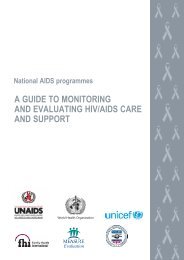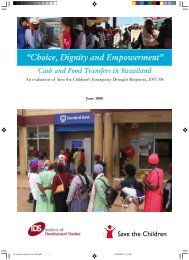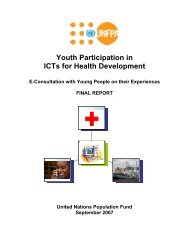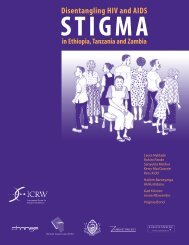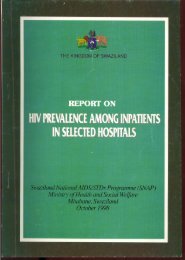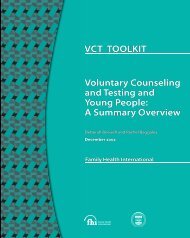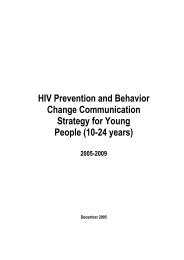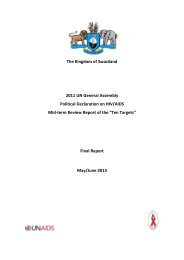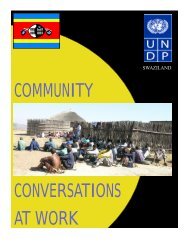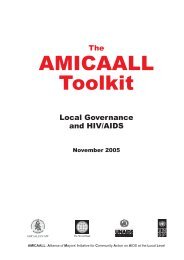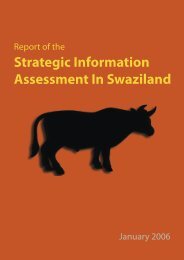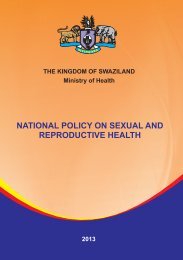HIV/AIDS+WORK Swaziland
HIV/AIDS, work and development - (NERCHA), the Info Centre
HIV/AIDS, work and development - (NERCHA), the Info Centre
- No tags were found...
You also want an ePaper? Increase the reach of your titles
YUMPU automatically turns print PDFs into web optimized ePapers that Google loves.
Table 4: Companies that have workplace <strong>HIV</strong>/AIDS policies21-49 50-99 100-249 250-599 >600 TotalPolicy on chronic diseases 1 2 4 2 2 11Policy on chronic diseases1 2 3 2 2 10including <strong>HIV</strong>/AIDSHave policy on eligibility or 5 2 2 2 2 8maintenance of medicalbenefitsHave a specific policy on4 1 2 1 0 13<strong>HIV</strong>/AIDSHave policy on <strong>HIV</strong> testing 0 1 2 0 1 4Do <strong>HIV</strong> testing of employees 0 1 0 0 0 1Do test applicants for <strong>HIV</strong> 0 1 0 0 0 1Source: Central Bank <strong>Swaziland</strong>iii HouseholdsAIDS-related morbidity and mortality havewide-ranging ramifications for households.These include increases in health-care costsand the diversion of labour from the farm tocare for the sick person. In the event of death,there is loss of labour, loss of institutionalmemory, loss of income if the deceased wasa breadwinner, and additional costs for thefuneral. These events, in turn, have a negativeimpact on the amount of land cultivated, thecrop yield and cropping patterns. Besides that,<strong>HIV</strong>/AIDS affects the growth of many marketsfor goods and services as affected householdsdivert expenditure to meet <strong>HIV</strong>/AIDS-relatedcosts. Non-essential goods with high elasticityof demand are likely to be more susceptibleto shifts in household expenditure than stapleproducts. Many middle-income householdsbecome poor, and market growth for goodsand services targeted at upwardly-mobilehouseholds may be negatively affected.Table 5 shows the result of a study on anagricultural household in <strong>Swaziland</strong> 33 . A clearcausality between the incidence of <strong>HIV</strong> and thedesired output can be seen. <strong>HIV</strong>/AIDS has ledto:• a reduction in crop yield and land undercultivation,• shifts in cropping patterns• an increase in the number of householdscaring for orphans• more children dropping out school due tolack of feesThe fact that the region receives little anderratic rainfall and has poor soils increasesthese households’ vulnerability to the impact.Furthermore, according to the results of thestudy, AIDS mortality is expected to reachits peak in the year 2008, which meansthat the worst is yet to be seen. The numberof orphans is expected to rise by 10,000every year for the next six years, and morehomes will be left destitute by the epidemic.Mitigation and coping strategies are at apreliminary stage and are yet to be refined. Anumber of commercial establishments haveinitiated health programmes for those withchronic illnesses and these programmes arebeing expanded and modified to deal with theincreasing demands caused by AIDS.Within the household, women are themost affected. A study by UNDP indicated thatwomen’s lack of access to land makes themmore vulnerable to <strong>HIV</strong>/AIDS as they are forcedto depend on men for it 34 . The majority of singleparentwomen reside on peri-urban areas inrented accommodation. They have nowhereto leave their children when they die. With thedeaths of such mothers, these children arelikely to be left homeless children.The UNDP study also found a growingnumber of child-headed households as aresult of both parents having died from AIDS.Such homes experience extreme difficulties intrying to survive and their poverty levels are aserious cause for concern. Some get sporadicassistance from the community, but this is notenough in the medium/long term.33 Muwanga. Impact of <strong>HIV</strong>/AIDS on agriculture and private sector in <strong>Swaziland</strong>.34 UNDP, Mbabane (2002) Gender-focussed responses to <strong>HIV</strong>/AIDS.14<strong>Swaziland</strong>: <strong>HIV</strong>/AIDS work and development



